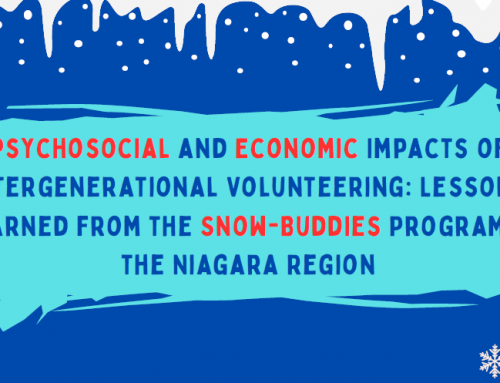“It is easier to build strong children than repair broken men” (Douglas, 1817). This quote is incredibly profound in its meaning. It is well known that children’s early relational experiences with their primary caregiver, particularly from conception to the third year of life, ultimately lay the foundation for development throughout the lifespan. Thus, given the significance of the first few days and years of life, early identification and intervention are pivotal to the successful outcomes of children.
Early Development Instrument
The Early Development Instrument (EDI) is a teacher-completed questionnaire that reflects the developmental status of young children upon school entry. The EDI data for Niagara shows that over time, the vulnerability of children in their second year of kindergarten has been increasing in the Social Competence and the Emotional Maturity domains in particular. Between 2011 and 2015, there was a significant increase in the percentage of children vulnerable in the Social Competence domain, and vulnerability was also higher in Niagara than the provincial average for 2015. In 2015, 14.3% of children were vulnerable in Emotional Maturity in Niagara, which was higher than the provincial average of 12.3%. If these trends continue on the current trajectory, Niagara is at risk for continuing to increase in vulnerability over and above the rest of the province.
This recent data is discouraging, particularly because social competence and emotional maturity are critical to a child’s academic, occupational, and relational success, among many other key life outcomes in the later years. In fact, it has been suggested that socio-emotional skills in Kindergarten have been linked to outcomes at 25 years of age (Jones, Greenberg, & Crowley, 2015). As such, failure to thrive in these areas is likely to have dire consequences on children’s functioning in adolescence and adulthood, which further supports the use of early developmental screening and intervention to promote socio-emotional wellbeing.
Ages and Stages Questionnaires
While the region-wide implementation of the EDI has provided a thorough understanding of the current landscape of children’s developmental in Niagara, waiting to assess developmental status in Kindergarten is simply too late.
Fortunately, services supporting young children and families across the region of Niagara understand the importance of prevention, promotion, and early intervention (well before schooling years). In collaboration with Infant Mental Health Promotion at the Hospital for Sick Children, a number of community agencies serving children and families in the Niagara Region adopted a developmental screening (i.e., Ages and Stages Questionnaires) and child-centered developmental support planning model to respond to the developmental needs of infants, toddlers, and young children from 0-5 years.
The Ages and Stages Questionnaires have consistently been shown to accurately and reliably identify developmental delays in communication, gross and fine motor skills, problem-solving, and personal-social skills across a number of different age groups, contexts, populations, and cultures (Squires, Bricker, & Potter, 1997). In fact, it has been shown that early developmental screening, even in the absence of intervention, decreases the risk of delay over time (i.e., when children were re-screened at a later age interval; Drotar et al., 2008).
Evaluating Early Screening and Intervention
Motivated to locally evaluate the effectiveness of the new screening and intervention model in improving outcomes among children in the community, the planning body that presented the first round of training in 2014 looked to strike an Infant Mental Health Advisory Committee and Pilot Project. The Pilot Project aims to assess the validity of the Ages and Stages Questionnaire for Niagara and to increase awareness of Infant Mental Health amongst the broader Niagara community.
There are over 20 agencies in Niagara who sit on this committee and are part of the pilot project, all of whom participated in the training. Dr. Chaya Kulkarni from Infant Mental Health Promotion at the Hospital for Sick Children, the facilitator of the training session, also sits on this committee and supports Niagara in the data collection process. The data has been collected for almost three years and will conclude in Dec. 2017.
To date, the Niagara Pilot Project has conducted over 500 developmental screens with more than 70 frontline practitioners and 200 families. While the project is still underway, a very preliminary analysis of developmental outcomes on a selected 25 at-risk children demonstrated that the intervention significantly improved Problem Solving and Gross Motor domains. Other domains including Personal-Social, Fine Motor Skills, and Communication also improved over time, but it was the former two areas that responded most to the intervention. Given the small sample size of this first analysis, we hope to confirm these initial trends when conducting a more in-depth analysis of the entire sample.
These initial findings support Niagara’s beliefs and value in early identification and intervention and suggest that future research should aim to link developmental data from the Ages and Stages Questionnaire to data from the Early Development Instrument. It is through this linkage of longitudinal data, that we will be able to understand how to proactively build strong children at the outset.
The Niagara Pilot Project will be completed in December 2017, with the data presentation in early spring. The committee in Niagara will then move forward to continue the work that has been underway to increase the knowledge of infant mental health.
If you are interested in learning more about the project, please reach out.
Sandy Toth
Executive Director
Strive Niagara
stoth@striveniagara.ca








